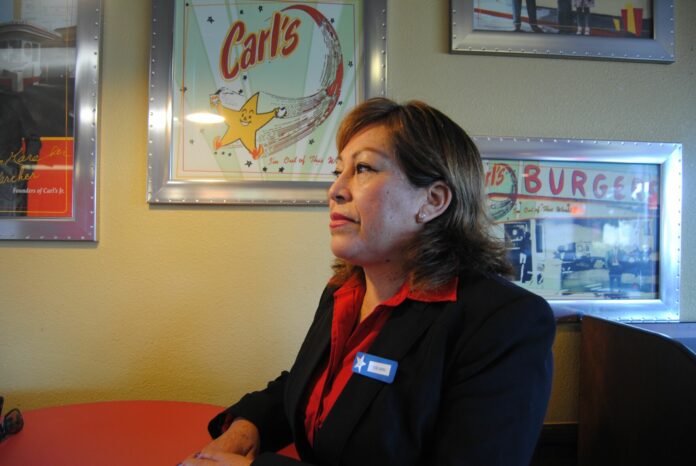For Healdsburg residents, there is one recognizable face they can instantly spot at their local Carl’s Jr. — Rutilia Perez, 50, has been working at the Carl’s Jr. in Healdsburg for 20 years. She has seen children grow up, memorized meals and made longtime friendships. Perez does not plan on leaving any time soon and her customers are glad.
Perez is currently a chief leader and has had the position for 10 years. She is from the Mexican state of Oaxaca and used to visit her father who lived and worked in Healdsburg when she was younger. She visited often, but once she got married, she moved to Sonoma County for work and to be with her husband who already lived in the area. She is the mother of an 11-year-old, who she loves to spend time with during her off time. Perez’s dad worked in the field, but she said she was never interested in a field working job. She had always wanted to work in something related to the food industry.
In her long tenure as a fast-food worker, Perez has dealt with a range of positive and negative experiences, but all of them are life lessons to her. Perez said her first manager welcomed her with open arms, but her coworkers did not.
“I don’t know if it is normal, but I had a lot of issues. I would cry because I wanted to leave but I had to work and pay my bills. They would put grease on my jacket, I didn’t know if things were supposed to be like that,” she said in Spanish about the hazing her coworkers put her through.
“They would blame me for everything. I had good and bad experiences. One time, I almost burned my feet with oil,” Perez said.
Later on, things got better, but Perez said for months she was bullied by her coworkers. She learned how to use the cash register and her salary started to go up. But then, the Carl’s Jr. was sold to a different proprietor. She used to have her days off during weekends but now she rests during the week. This does not bother her since she gets to spend time with her only son. Though it’s crossed her mind, she has not decided to look for another job. People have told her she does not make enough money, but Perez said she enjoys her job.
“Seeing the clients smiling, people asking me why I did not go one day or that they like the way I work — a lot of people who appreciate me, people I have known for years and are older now,” she said about the reasons she would not leave. For Perez, her customers make it all worth it. The connection goes beyond memorizing the orders of her regulars. Recently, she learned that one of her regular customers passed away.
“It is nice, for people to say good morning or ask how you are. You meet their children and tell you about … when they were younger,” Perez reminisced about watching people grow up through her eyes over the counter.
Over the years she has received presents and compliments — a customer once surprised her with flowers and chocolates. At the start of her time there, a young man professed his love for her.
“He gave them to me because he liked how I served his family — it was during Christmastime,” she said, laughing as she remembered the man who gave her flowers.
“I think I will stay here. This restaurant has something that I like. The way people love me is enough,” she said.
Even though her English is not fluent, Perez understands enough and communicates perfectly with customers.
“It was hard to learn everything but here I am. This is like my second home,” she said.
In a recent public Facebook post, someone praised Perez’s work and customer service. Rapidly, more people commented, recognizing her for her work and service.
One community member said Perez knew his father’s order and told a story about her checking on a homeless man she never charged for coffee.
When the pandemic started, Perez worked tirelessly and with no breaks. However, she said clients always thanked her for her work.
“Sometimes I would not eat to be able to serve my clients,” she said. For a while, she worked alone.
Still, there is not enough staff. Perez said the chain restaurant almost closed during the pandemic, which made her panic.
While she has had positive experiences, she has had her fair share of unpleasant ones. She closed the restaurant one day for an hour during the pandemic to be able to eat lunch with a coworker. A man complained it was closed and cursed her out.
“‘You no break, f—- you, Mexican’ he said. I wanted to cry and yell but did not say anything,” Perez said. “I had put a sign outside which said we were on break. I was throwing out the trash when he yelled.”
In 20 years, she has gotten used to people being upset. It does not bother her anymore, mainly because there’s a balance — for one client who complains, another thanks her.
“Sometimes people discriminate against us because we are Mexican or because we do not get the food out fast enough. We were fighting to have the restaurant survive and people do not see that,” she said.
But it is because of those who sometimes apologize for another’s actions that Perez gladly walks into work every day. She plans to stay for as long as she can and doesn’t see herself going anywhere else in the near future.
“I am happy to work there, I want people to know we hope they leave happy. We hope they continue to support us, because of them we have a job. Without them we have nothing,” she said.
53.8
F
Healdsburg
July 3, 2025









